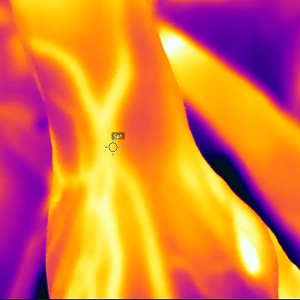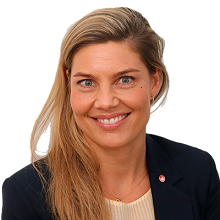Home Based monitoring with Thermography for detection of postoperative infection

After surgery, patient and surgeon wish to avoid ONE thing
– INFECTION in the surgical wound
The Thermography studies will investigate how we can detect and monitor early signs of infection, before the patient develop symptoms and how we use the discipline of thermography evidence based in clinical practice. The aim is to improve postsurgical care for patients and avoid complications to surgery.
It might even be possible to monitor patients outside the hospital by small thermographic cameras that your ad on to a mobile phone. If thermography can be used as an adjunct tool to improve surveillance from the patient's home setting, then we can minimize follow up visits in the outpatient clinic and avoid unnecessary time and resource consumption for both the patient and in the healthcare system.
This project will generate a huge amount of precise data, a unique and well-suited base to work with machine learning and AI solutions. The political tendency is that health data will be used to develop AI solutions in healthcare – maybe not in an evidence and rational way though - we clinicians need to devote ourselves in this innovative process and keep focus on a clinical intelligent way of learning and secure an evidence-based introduction of AI into clinical practice.
The setup is multidisciplinary international cross-sectional studies. The Thermography studies will focus on orthopedic patients with external frames. These patients are in considerable risk of infection during treatment period of several months, and an infection can in worst case scenario be limb threatening. The experience and knowledge will we obtain from this project can be used in general to improve care for patients after surgery in the future.
The Thermography studies is a part of the clinical intelligence project – a new innovative solution to care for post-surgical patients with new technology equipment and evidence bases use of AI In health care.

I think we as clinicians are obligated to develop medicine evidence based. There is a hot ongoing debate and a lot of unanswered questions about - will doctors in the future be replaced with robots – I don’t think that’s quite realistic!
I have for the next period devoted myself to bring orthopedic surgery into the next aera of Medical use of AI with Clinical intelligence in an interdisciplinary research group. My PHD studies will focus on orthopedic patients with external frames, how can we detect and monitor signs of infection and how can we use the discipline of thermography as an adjunct tool to improve surveillance. The research will be multidisciplinary and international cross-sectional studies. Let’s aim for clinical intelligent new solutions for improving patient care in the future!




Marie Fridberg

Marie Fridberg
Project manager, MD, PhD-student
Specialist in Orthopedic surgery
Orthopaedic Research Unit
Department of Orthopaedics
Aalborg University Hospital
m.fridberg@rn.dk
Supervisors
Professor, PhD, MD Søren Kold
Professor PhD, MD Ole Rahbek
Opdateret


